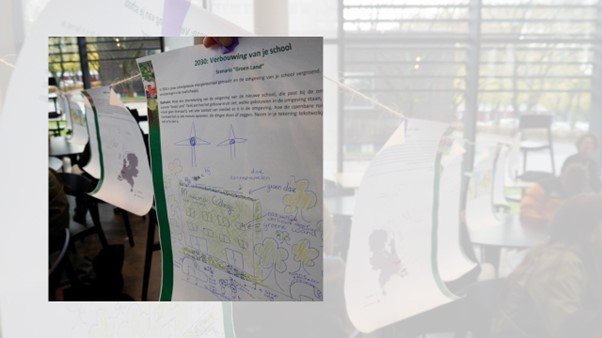The Future Generation and the Future: connecting school geography and long-term planning of the Netherlands

This project aimed to consider sustainable futures by giving voice to the future generation and simultaneously contributing to the practice of stimulating ‘futures literacy’ in secondary schools. Futures are envisioned in a way that social science knowledge and natural science knowledge are combined and connected to stakeholders and societal developments.
Led by a team of UU researchers consisting of Tine Béneker, Peter Pelzer, Tim Favier and Jaimy van Dijk, this project activity was a collaborative journey with geography teachers (‘train the trainer’) and two partners who are respectively engaged with geography education (Koninklijk Nederlands Aardrijkskundig Genootschap Royal Dutch Geographical Society) and with the long-term spatial future of the Netherlands (NL2100 by College van Rijksadviseurs- board of government advisors).
Results of the Project
A lesson series, Timelines for the Netherlands, was developed, with the aim to give students a hopeful perspective on the future by experiencing that multiple futures are possible. There is much occuring in the physical environment at the moment, such as how we deal with the implications of climate change. Often these kinds of issues get negative coverage in the news. This can lead students to experience feelings of powerlessness. In four lessons, students look at developments around the themes of housing, energy, mobility and nature and agriculture from the perspective of The Netherlands. Through various creative assignments the students experience both past and future across a timeline. The scenarios from the Ruimtelijke Verkenning (Spatial Outlook) 2023 by the PBL Netherlands Environmental Assessment Agency were used to visualize the future - one more technology oriented, the other more ecology oriented.
This lesson series helps students understand how thinking has shifted in terms of what people thought was important and what they saw as a desirable future. This helps to break through the idea that things just are the way they are, and that the current situation is self-evident. For example, citizens have influenced spatial development: as voters or by protesting.
In extension towards the future, students experience that different futures are possible by comparing the same assignment, yet in different scenarios. For example, a school in 2030 in the technology oriented scenario looks way different than a school in the ecology oriented scenario.
The lesson series was tested several times in practice, both with teachers (for example on the Education day (KNAG Onderwijsdag on November 22nd, 2023) and with third year secondary school students (on the U-talent day November 11th, 2023). Both teachers and students showed engagement with the Timeline scenario thinking activities, valued the activating method overall and the stimulation of creativity with the different assignments. Moreover the lesson series is connected to various initiatives resolving around the notion of a 'pedagogy of hope’, in a larger project for secondary school teachers.
Finally, the method is also included in the Handbook of Future Thinking, developed by the board of government advisors (CRa). A special version for geography teachers is available.
This project was made possible through Pathways to Sustainability Seed funding.

